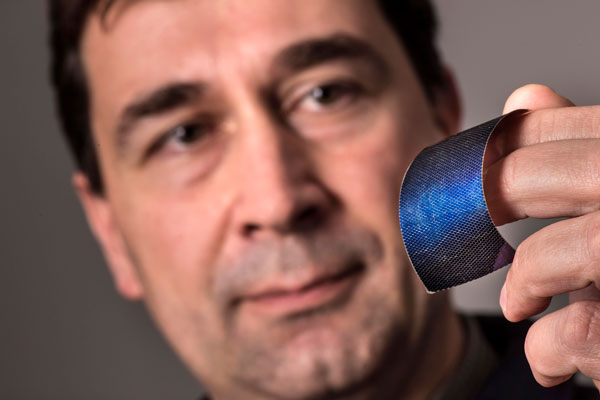New program enables Sandia, Los Alamos labs to help companies mature technologies

A recently signed New Mexico law enables Sandia and Los Alamos national laboratories to assist in turning transferred technology into viable products and services, which could boost innovation and create jobs, according to Sandia business development experts.
The Technology Readiness Gross Receipts Tax Credit is a three-year pilot technology maturation program that helps address a critical stage between technology development and commercialization, when many companies need additional funding to ready products and services for the marketplace.
New Mexico companies that obtain a license from Sandia or Los Alamos national labs or have a Cooperative Research and Development Agreement will be able to apply for up to $150,000 in direct technical assistance per year for prototyping, proof-of-concept, field demonstrations, technical validation, testing and development or other activities.
“We are thrilled that the state of New Mexico created a new program that allows companies to partner with national lab researchers to advance a technology past the invention stage into a matured technology,” said Jackie Kerby Moore, manager of technology and economic development at Sandia.
Closing the funding gap
When technology is transferred out of the laboratories, often significant capital investment and development are required to mature the technology and make it market-ready. Frequently, there is a void in funding to develop it further into a minimum viable product for commercial applications.
While Sandia and Los Alamos can help further mature previously transferred technologies, there wasn’t a program in place that allowed them to easily engage with New Mexico companies in this way.
“We’re bridging the R&D gap for New Mexico businesses,” said Duncan McBranch, program director of Entrepreneurship for Mission Innovation at Los Alamos National Laboratory. “This matters because 99% of New Mexico businesses are small businesses with limited budgets. Access to the expertise and technology offered at Sandia and Los Alamos national laboratories makes this extensive and expensive process more affordable.”
The new program, which goes into effect July 1, places labs technologies on a smoother path toward commercialization.
“We plan to help companies develop their products to a point where a customer will buy or an investor will invest,” Jackie said.
Both laboratories will be able to claim tax credits against their gross receipts tax liabilities for their work with businesses. Each lab can claim up to $500,000 the first year, $750,000 the second year, and $1 million the third year. In total, the labs will be able to provide up to $4.5 million in time, technical assistance and resources over three years.
“The new program is an essential and exciting mechanism that provides much-needed expertise from the labs to mature technologies for market readiness,” said Mary Monson, senior manager of business development at Sandia. “We are confident that this could lead to increased innovation and jobs that benefit New Mexico’s growing tech industry.”
Tax credit model
The Technology Readiness Gross Receipts Tax Credit is modeled after the New Mexico Small Business Assistance Program, which has successfully paired Sandia and Los Alamos with small companies facing technical problems for 20 years.
However, there are a few significant differences between the NMSBA program and the tax credit. While the new program helps New Mexico companies that apply for assistance after obtaining a license from one of the labs or a Cooperative Research and Development Agreement, the NMSBA program helps small businesses in the state that apply for help with a technical problem, regardless of whether they licensed technology from the labs or have a CRADA.
The new program also provides a higher dollar amount of technical assistance per company, up to $150,000 per year. Through the NMSBA program, eligible rural companies may receive up to $40,000 in research and development from the labs or $20,000 for eligible companies located in Bernalillo and Santa Fe counties.
“The NMSBA program helps businesses with a wide variety of technical challenges, whereas the goal of the new program is to really focus on taking an idea all the way through to commercialization,” said Genaro Montoya, who leads the NMSBA program for Sandia. “We hope this significantly accelerates technology development in the state and creates jobs.”